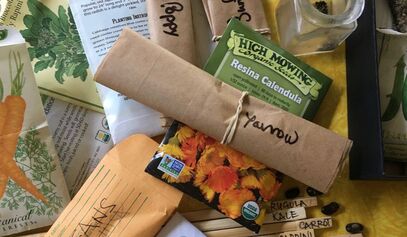
I'm sure that, like me, you're wondering when we'll be allowed to resume normal life. But I'm also thinking it would be a shame to go back to business as usual, without taking this unprecedented opportunity to reflect deeply about what exactly we want to return to.
There's some real, radical reflection going on--at all levels. For example, no less than 10 European countries are calling for a European Green Deal to be at the heart of Europe's post-COVID recovery plan. The Pope has called for a universal basic income, and Spain has pledged to implement one as soon as possible.
What do we want in our own lives?
I've been actively thinking about what this forced pause has taught me, and about how I want to restart my life. For example, how can I continue not commuting so much? How can I continue to have time for gardening? How can I act to nudge the post-pandemic world in the right direction?
These are vital questions. We have always been told that we can't just stop the way of the world. Or that we can't just change everything all at once. But in the last month, that's exactly what's happened. A lot of people have lost a lot: their lives, their livelihoods, their sense of security. Let's not have that be in vain.
Now's the time: what do you really want?
The French philosopher and sociologist Bruno Latour has recently come up with a questionnaire to help us reflect, as a society, on how we want our world to be, post-COVID-19.
Here is my version of his questions. I think these work for personal reflection as well as socially.
For some inspiring and practical ideas about how to imagine a different and better world, as well as examples of people and communities who have done it, read "From what is to what if: unleashing the power of the imagination to create the future we want", by Rob Hopkins.
For some powerful (inter)personal re-imagining, read "The body is not an apology: the power of radical self-love", by Sonya Renee Taylor.
Let's re-imagine the world, for real.
There's some real, radical reflection going on--at all levels. For example, no less than 10 European countries are calling for a European Green Deal to be at the heart of Europe's post-COVID recovery plan. The Pope has called for a universal basic income, and Spain has pledged to implement one as soon as possible.
What do we want in our own lives?
I've been actively thinking about what this forced pause has taught me, and about how I want to restart my life. For example, how can I continue not commuting so much? How can I continue to have time for gardening? How can I act to nudge the post-pandemic world in the right direction?
These are vital questions. We have always been told that we can't just stop the way of the world. Or that we can't just change everything all at once. But in the last month, that's exactly what's happened. A lot of people have lost a lot: their lives, their livelihoods, their sense of security. Let's not have that be in vain.
Now's the time: what do you really want?
The French philosopher and sociologist Bruno Latour has recently come up with a questionnaire to help us reflect, as a society, on how we want our world to be, post-COVID-19.
Here is my version of his questions. I think these work for personal reflection as well as socially.
- Which ways of living/activities/businesses would you prefer not to resume?
- What about these ways of living/activities/businesses makes them undesirable and in need of being phased out?
- How would stopping these make it easier to do something different and what would that something different be?
- How could we find work and income for people (including ourselves perhaps) currently employed in the ways of living/activities/businesses that should be phased out?
- Which ways of living/activities/business should restart, and what new ways of living/activities/businesses could/should be developed?
- What about these ways of living/activities/businesses makes them desirable and good? How do they contribute to improving your life/society/community/world? How do they replace the ones we want to render obsolete?
- How can we support the creation/development of these better ways of living/activities/businesses?
For some inspiring and practical ideas about how to imagine a different and better world, as well as examples of people and communities who have done it, read "From what is to what if: unleashing the power of the imagination to create the future we want", by Rob Hopkins.
For some powerful (inter)personal re-imagining, read "The body is not an apology: the power of radical self-love", by Sonya Renee Taylor.
Let's re-imagine the world, for real.
 RSS Feed
RSS Feed